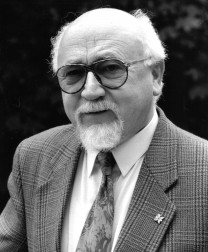Prof. Dr. em Josef Franz Thiel was born in 1932. He grew up in Filipovo, a village in the region of Vojvodina, which nowadays is part of Serbia. Even though Filipovo was almost purely German, due to the multi-ethnic region Vojvodina, Thiel learned German as well as Hungarian and Serbian. Furthermore, he developed an early interest in history, literature and foreign cultures.
During World War II Thiel eventually had to abort school in 1944. He took up an apprenticeship in order to become a locksmith. The same year his father was interned in a labour camp by the russian. In 1945 Thiel and his relatives were forced into a concentration camp near the hungarian border and eventually were moved to a labour camp after the war. In 1947 they fled to Austria, where Thiel worked as a farm hand. In 1953 he finished school.
The same year Thiel joined the Steyler missionaries (SVD) and took up his novitiate in St.Gabriel/Mödling. Through the courses of Paul Schebesta Thiel developed a growing interest in Anthropology and Medicine. Moreover, he not only attended lectures on Theology but also also on Philosophy and Rhetoric. Eventually he did an internship at a hospital and took courses at the Department of Social and Cultural Anthropology in Vienna.
After he had completed his theological education, Thiel went to the Republic of Kongo in 1961. There he not only worked as a missionary and did some field research but also helped establishing educational and health programs. In 1964 Thiel moved to Paris, where he studied Sociology. Georges Balandier and Paul Mercier were among his teachers. After his return Germany, Thiel graduated in 1969.
Eventually Thiel took up a position at the Anthropos-Institute and began lecturing. Moreover, he worked for the journal »Anthropos«. Eventually Thiel also became a member of the expert body for anthropology of the German Research Foundation (Deutsche Forschungsgesellschaft, DFG). Furthermore, he started to write his habilitation thesis, which he completed in 1974. After his habilitation Thiel not only worked at the Anthropos-Institute but lectured at the University in Bonn.
In 1985 Thiel was appointed head chairman of the Museum for the Cultures of the World in Frankfurt/Main. During the following years he not only organized a large number of exhibitions but also established a closer cooperation of anthropological museums throughout germany.
Moreover, Thiel became chairman of the German Association of Anthropologists (Deutsche Gesellschaft für Völkerkunde, DGV) in 1993. He retired in 1998.
Short Portrait: Josef Franz Thiel

Josef Franz Thiel
 further information
further information



